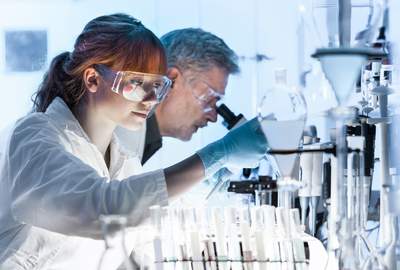You may never know their names, see their faces, or hear their voices, yet they could have a profound impact on your health and wellbeing. They are the experts who provide laboratory testing and analysis at Froedtert South hospitals. We recently invited three of these providers to reflect on what they do, along with a cancer doctor who relies on their expertise and the many contributions they make to your good health by personalizing the care you receive.
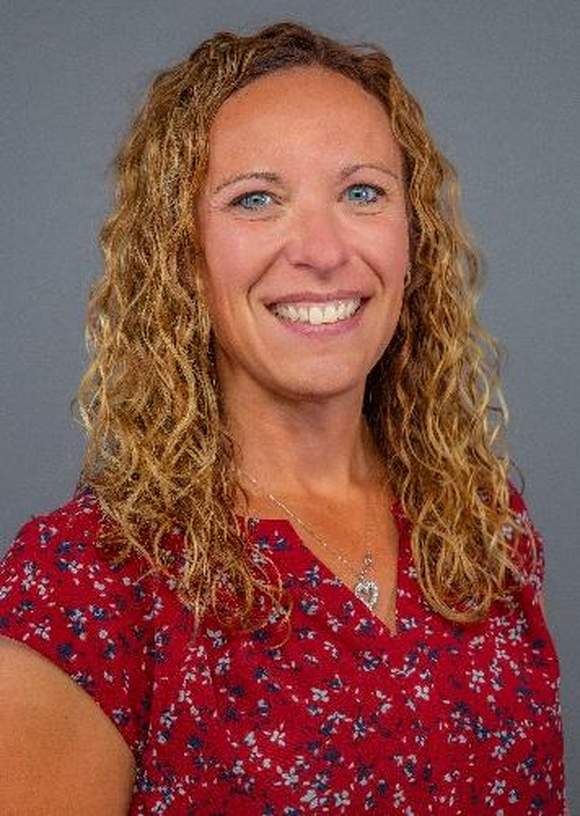
Heather Hebior, Director of Laboratory Services
Help that comes from invisible hands
I direct a staff of approximately 85, including phlebotomists who collect the blood and other non-blood specimens such as urine and throat/nasal swabs, along with the medical technicians and laboratory scientists who perform testing on those samples. We staff the labs at Froedtert Kenosha Hospital and Froedtert Pleasant Prairie Hospital, 24 hours a day, seven days a week. The labs serve patients at the Froedtert South hospitals, outpatient surgery center, and four clinics.
For the most part, we are the folks that no one knows much about. Patients see their physician. They see the phlebotomist who collects their blood or other non-blood specimens. But Laboratory staff is not a face generally seen by patients. Yet we are very important to patients because we provide physicians with the lab results they use for over three quarters of their patients to diagnose illnesses, determine the best ways to treat them, and monitor the progress of those treatments.
The test that most patients recognize is called a lipid panel. It is a common blood test that measures cholesterol and triglyceride levels that increase patients’ risks of heart disease and stroke. We also perform complete blood counts that measure red and white blood cells, looking for cancer, anemia and other conditions. Additional testing includes urine samples to detect kidney disease and urinary tract infections. We also perform tests that measure blood clotting prior to surgery, and are used to evaluate for liver disease or to monitor patients on blood thinners.
Those are just some of the approximately 274 different tests we can perform, and it seems like new tests are arriving every day. One of the biggest advances right now is gene sequencing, where we are detecting certain genes to predict diseases that may not yet even be showing symptoms.
When I was younger and thinking about a career, I knew I wanted to be in healthcare. I found that I really liked the medical lab sciences because of the role these test results play in helping patients by giving physicians the critical information they need to diagnose and treat illnesses. It is a fantastic career that has allowed me to grow from working “on the bench” to becoming lab director. I love my job. I have been doing it for 21 years and wouldn’t change a thing.
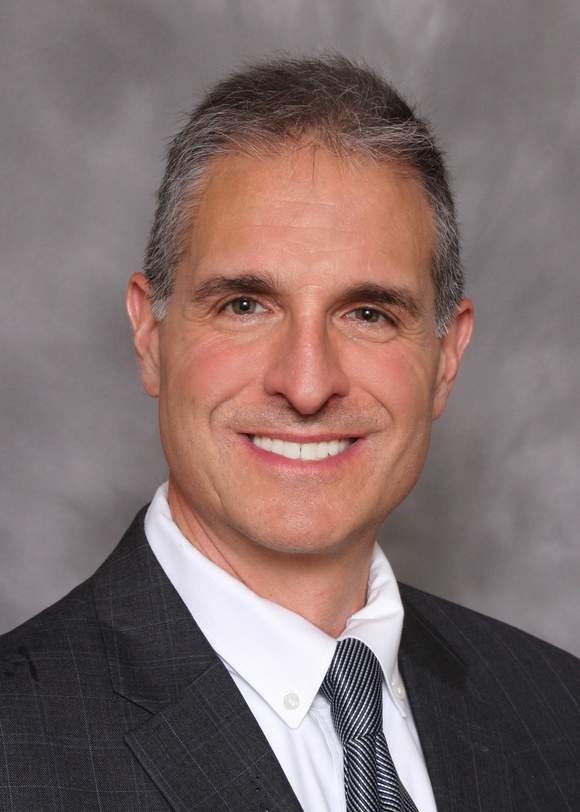
Kenneth Wind, M.D., Medical Director of Pathology, Froedtert South and Assistant Professor, Medical College of Wisconsin (MCW)
Pathology is for the living
My role in patient care is largely working behind the scenes to help ensure every Froedtert South patient receives an accurate diagnosis. Health care is a team effort, and I think of myself as a critical member of the Froedtert South team that is having a significant impact on patients' lives.
The art and science of practicing pathology as a medical specialty is widely misunderstood by patients, who often think that conducting autopsies is how most pathologists spend their time. To the contrary, my work is examining and analyzing blood, urine, and tissue samples of living patients to help accurately diagnose and treat their illnesses.
Often, I do this alongside surgeons and other physicians in the operating or examination rooms to bring my expertise right to a patient’s bedside, and help speed diagnosis and treatment decisions. For example: one of the procedures I help perform is called rapid on-site evaluation, or ROSE. Here’s how it works: an interventional radiologist uses a minimally invasive procedure to collect a sample from a patient’s suspicious tumor or lesion. Then right there in the room where the sample is taken, I examine it under a microscope. I do this to ensure the sample is large enough and appropriate for the lab tests that we need to perform. If the tissue sample isn’t suitable, the interventional radiologist can immediately collect another sample. That means the patient doesn’t have to undergo the same procedure at a later date, or endure additional worrying while their diagnosis is delayed.
In the operating room, I use a procedure called “frozen section” to microscopically examine tissue samples obtained during surgery and make a diagnosis, which may include cancer. This helps surgeons immediately ensure that they have removed a malignant tumor in its entirety, determine if a cancer has spread, or better understand how a patient’s cancer is progressing. Determining that a tissue sample is not cancerous may make a more extensive operation unnecessary.
I am also increasingly involved in personalized medicine, which targets treatments to the molecular characteristics of a patient’s cancer. My role is to ensure that tissue samples collected from the patient are appropriate to determine if they qualify for a clinical trial, or to help the patient’s physician determine their best course of treatment – which may include immunotherapy to boost a patient’s immune system and target specific molecular abnormalities on tumor cells.
When I have a challenging diagnostic question, I am able to collaborate with my pathologist colleagues at MCW who have advanced training in their areas of expertise. Patients benefit from their expert opinions to help ensure that they receive the best treatment.
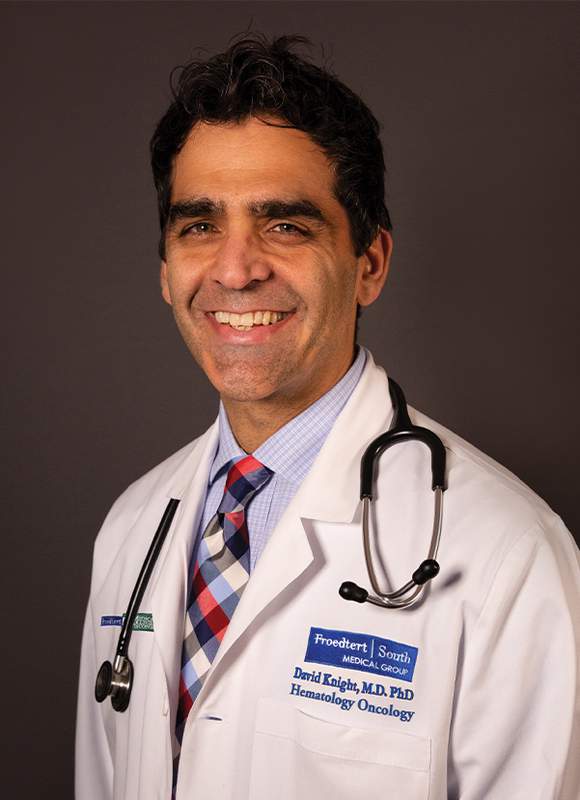
David Knight, M.D., Hematologist/Oncologist
Cancer treatment that gets personal
As a cancer doctor, one of the most dramatic ways in which lab services directs us is in the area of personalized medicine.
In the past, cancer treatments looked more like a shotgun approach: chemotherapy drugs that killed cancer cells, but also damaged normal cells and caused side effects. Today, molecular biology has identified hundreds of abnormalities in the proteins and genes of certain cancer cells. Drugs have been developed to target those weaknesses and kill cancer cells more effectively, while leaving more normal cells undamaged.
Biopsies are performed for virtually every patient we treat to look for these abnormalities so we can customize treatments to attack their cancer as effectively as possible. Our partners at MCW and Wisconsin Diagnostic Laboratories (WDL) help us do that all day, every day. Let’s say we’re testing a patient with gastric cancer. During a biopsy, or in the operating room during surgery, the pathologist can process and examine a tissue sample with sufficient accuracy to determine whether or not cancer cells are present. The answer can determine the surgeon’s next steps, and provides information to make treatment decisions that, ultimately, help achieve the best outcome for the patient.
Similarly, when a surgeon removes a tumor, the pathologist looks at the margins around the tumor to make sure it’s all normal tissue. Knowing at the bedside that the margins are clean allows the surgeon to know that the entire tumor was removed, that no cancer was left behind.
My specialty, hematology/oncology, is one of the most highly complex, rapidly evolving fields in healthcare. Having the combined reliability and expertise of Froedtert South, MCW, and WDL is unique, and it separates us from other institutions that don’t have a relationship with an academic medical center. Make no mistake, the places where academic medicine happens – places like Froedtert and the Medical College of Wisconsin –are the thought leaders treating patients. Every hematologist/oncologist like me is talking to people around their region and across the country every day to get assistance in diagnosing cancers, and analyzing molecular biology and genetics. Having the professional, one-on-one relationships that we have with the experts at MCW and WDL gives us an in, a pipeline to the experts who help drive this entire field of medicine.
That makes us different, and it helps our patients.
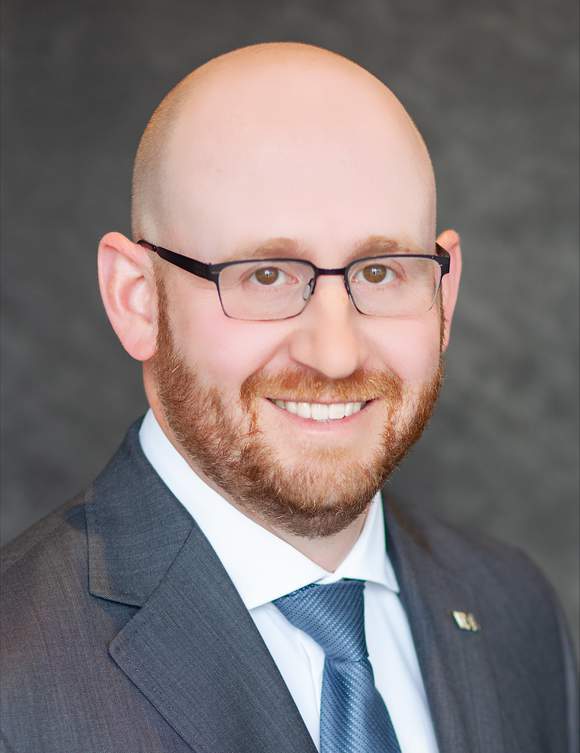
Steve Serota, President and Chief Operating Officer, Wisconsin Diagnostic Laboratories
World class care close to home
As a subsidiary of Froedtert Health, WDL is one of the very few laboratories that have pathologists who are board certified in the subspecialties in which they are interpreting lab results. For example: if you have a kidney condition, your tests are being reviewed by a pathologist who has expertise and is board certified in that specialty. Having someone with the full breadth and depth in a particular specialty results in better diagnoses and, in turn, the most appropriate care and patient treatment plans.
We are the doctors’ doctors. Patients go to their doctors with questions, and their doctors come to us to help provide the answers. Think of it this way: you’ve got one physician interacting with a patient, but behind that doctor there’s a team of 56 board-certified, subspecialist pathologists at WDL. And behind those pathologists is a team of 500 specially trained clinical laboratory professionals who are supporting those pathologists.
Our testing capabilities are in step with the largest labs in the world, providing Froedtert South physicians access to any diagnostic tool that’s available in the industry - diagnostic tests that are at least comparable, if not superior, to any academic medical center anywhere in the world.
During the COVID-19 pandemic, WDL provided about a fourth of all the COVID-19 testing done in the state of Wisconsin. When most other labs had COVID-19 testing turnaround times of four to seven days, WDL averaged less than 12 to 24 hours, allowing Froedtert South to make quicker decisions for their patients and communities.
The relationship between Froedtert South, MCW and WDL enables the people of Kenosha County to have access to leading-edge diagnostics that aren’t readily accessible in a lot of other communities. To all of us at WDL, every tube, every slide, every piece of tissue is a patient. We see ourselves as direct members of each patient’s care team with the singular goal of making sure each patient gets the most accurate treatment possible.
All things considered…
With medical technicians and scientists working around the clock, and with the assistance of dozens of extraordinarily qualified pathologists at MCW and Wisconsin Diagnostic Laboratories, Froedtert South delivers world class laboratory testing to ensure that every patient receives the most accurate and timely diagnosis and treatment.
